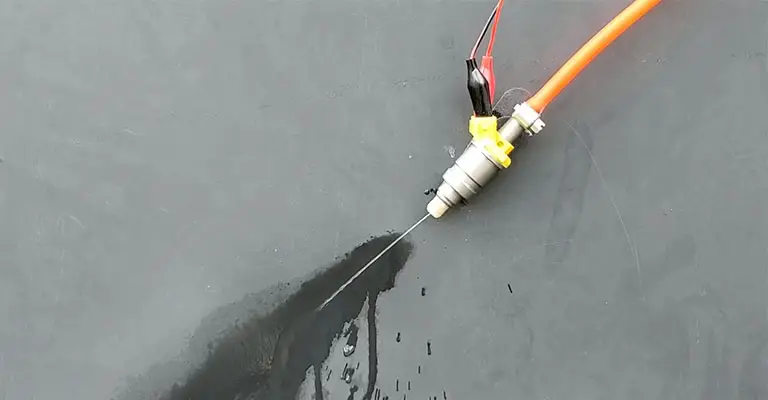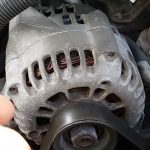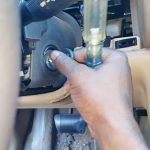Fuel injector cleaners are used in car engines to prevent the buildup of deposits that can cause engine failure and performance issues.
They are usually made of a combination of lubricant and carbon-based material, which can help reduce the formation of carbon deposits. What happens if you put too much fuel injector cleaner?
You run the risk of damaging the gasoline tank lining if you put too much fuel injector cleaner in it. Aside from this, you may have noticed a decrease in engine performance and fuel efficiency.
Additionally, you may notice that engine performance and fuel efficiency have been reduced. You can add some fresh petrol to even things out by running the car until the gas tank is about a quarter full.
There is no solid proof that too much cleaner can increase the viscosity of motor oil, but some drivers are concerned.
The majority of cleaners don’t contain corrosive solvents that would damage seals or hoses, so check the ingredients.
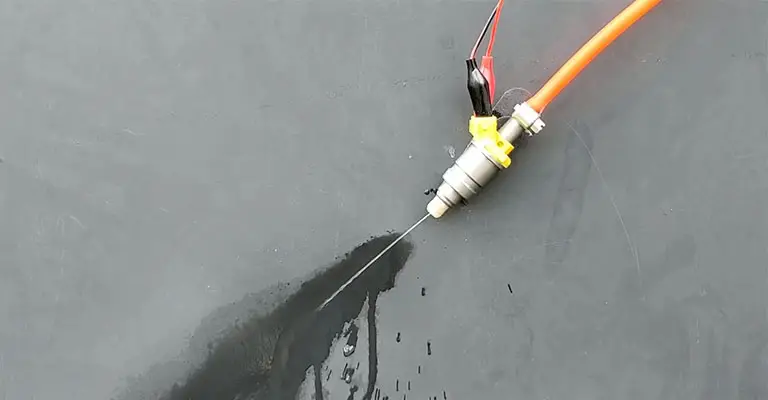
Are Fuel Injector Cleaners Effective?
Injector cleaners are widely used by drivers to improve engine performance, fuel efficiency, and car performance.
If the injectors and fuel system are severely blocked and dirty, using a cleaner one time may not remove stubborn deposits.
A cleaner will benefit your tank if you add some often to prevent buildup and release any debris that is already there.
When using a fuel injector cleaner, it is recommended to put it in a nearly empty tank, but you can use it in a full tank as well.
However, if the fuel amount is too high, the effect will be diluted, resulting in a lower cleaning efficiency for the injectors. For maximum performance, wait at least 20 minutes after adding the cleaner before driving.
Things That Can Happen If You Put Too Much Fuel Injector Cleaner
The inside of the injector may just be scratched by lower-quality cleaners and not fully dissolved. A cleaner should be added to the fuel so that it mixes with it.
When the gas tank is half full, full, or just before filling it up, a tank cleaner can be added.
You should be familiar with specific problems associated with using a fuel injector cleaner, regardless of the type of product you choose.
Damage To Sensors
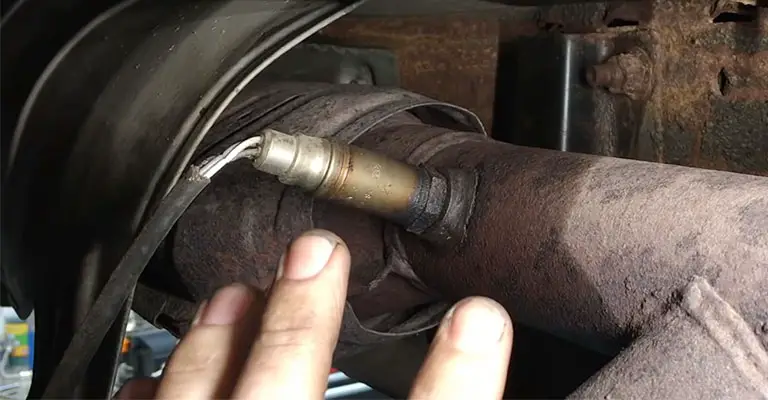
Oxygen sensors can malfunction or be damaged by a fuel injector cleaner that contains additives that aren’t sensor safe.
In addition, carbon and burned fuel are attracted to oily substances like seafoam and MMO, affecting a sensor’s performance.
Damaged O2 sensors can cause engine hiccups, black exhaust, reduced fuel efficiency, and cause the check engine light to come on.
Cleaning The Wrong Type Of Engine With The Wrong Cleaner
A gas-formulated product can cause problems in a diesel system if it is injected into a gas-formulated system. Injector cleaner is not too noticeable when used in small amounts.
When the wrong additives are added to a car’s fuel system, the internal system must be drained.
As a result, cleaners are used more often in diesel-powered vehicles. Strong solvents in cleaners can cause harm, so be aware of what is in them.
The fuel Pump And Tank Lining Damaged
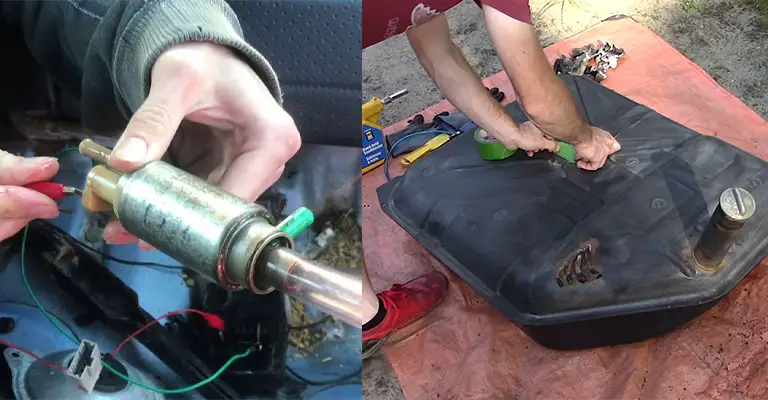
Before adding any product to your vehicle, make sure you read the ingredients. Fuel tank linings can be damaged by cleaners, or they can exacerbate existing problems with corrosive fuel pumps if they contain corrosive agents.
Clogs That Are Insufferable
Some cleaners do not remove debris from injectors but release it into the fuel system as they loosen up. Nevertheless, they are not dissolved.
So, you can still have clogs if your cleaner isn’t powerful enough or the formula isn’t right for your car.
What Causes A Fuel Injector To Become Dirty?
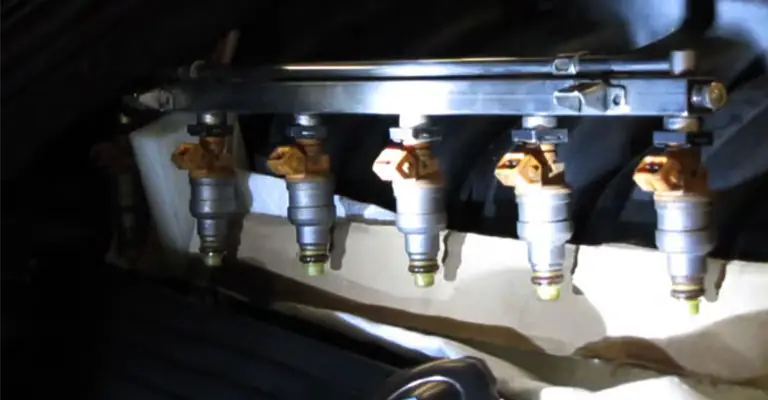
The regular operation of vehicles and their components leads to the accumulation of dirt on them. On the surface of the fuel injector nozzle, fumes from gasoline harden once the engine is shut off.
There are a number of additives in fuel, some of which help clean the fuel injector, but it is not always sufficient, and additional cleaning may be needed.
Fuel injector nozzles can also be damaged by debris from the fuel itself. Make sure you purchase your gas from a reliable company so that you won’t end up with a bad product.
What Is The Average Time It Takes For A Fuel Injector Cleaner To Work?
Fuel injector cleaners do not have any scientific evidence to support their effectiveness or even how long they last. Another factor that affects how well or quickly a fuel injector cleaner works is the type of cleaner.
If the system is dirty, the additives will have a harder time breaking down everything. As soon as the additives make their way through the system, the fuel injector cleaner begins working.
When you do a fair amount of driving after using the additive, you should see an improvement in performance within the same day.
How Often Should You Use a Fuel Injector Cleaner?
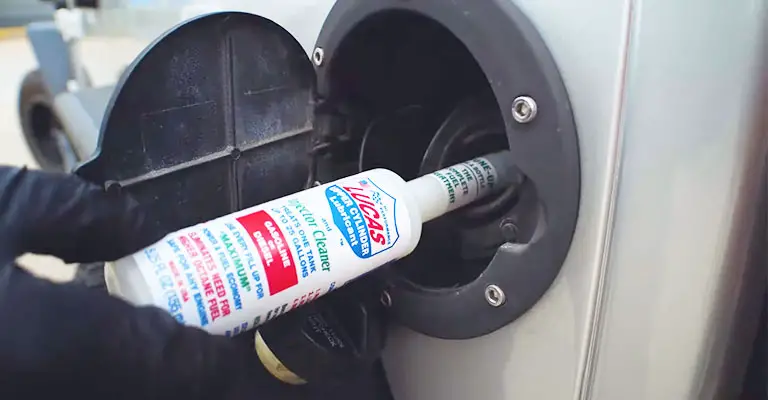
The cleaners reduce pollution emitted by your car while maintaining your engine’s performance. Even though these cleaners do much of the heavy lifting, it is still important to know how to use them.
Fuel injector cleaner should be used after 1,500 to 5,000 miles of driving. Getting your oil changed at the same time you use a fuel injector cleaner will help you remember to use it.
Regular use will cause deposits to form, but they won’t accumulate quickly enough to require more frequent cleaning.
Is It Possible To Use Too Much Fuel Injector Cleaner?
You can harm your car by overusing your cleaner too frequently or failing to follow its instructions.
For example, there have been reports of engine lining and sealants being damaged by too much cleaner used too frequently.
Combustion chamber damage can also result from fuel injector cleaners. Occasionally, fuel injector cleaner can cause harm, but overusing it a few times shouldn’t cause any immediate problems.
You should continue to drive your car normally if you accidentally use too much fuel injector cleaner.
It would be best if you refilled your tank after using half to three-quarters of a tank. The extra gasoline will dilute any remaining fuel injector cleaner.
Should Fuel Injector Cleaner Be Used Before Or After Gas?
Before you fill a gas tank with gas, you should usually add a fuel injector cleaner. A nearly empty or empty tank is ideal. The mixture becomes more complete when fuel additives are placed in the tank first.
The method also ensures that the correct amount of additive and fuel is mixed, even if not using a full bottle. There are, however, differences between each product.
There are some cleaners that do not need to be placed in the tank before gasoline. To ensure that your product is being used properly, check the directions.
Is It Safe To Put Fuel Injector Cleaner In A Full Tank?
Fuel injector cleaners can be used with a full tank, but the cleaning process won’t be affected much. However, fuel injector cleaners should be used in almost empty tanks to prevent the fuel from thinning them.
Make sure you follow the manufacturer’s instructions on adding it to a full gasoline tank and follow the manufacturer’s instructions on when to use it.
Make sure you drive your car for at least 20 minutes so the cleaner can circulate through the engine. It is possible to reduce fuel consumption and improve engine performance by regularly adding fuel injector cleaner to your tank.
Follow the manufacturer’s instructions on how much fuel injector cleaner to use in the air intake manifold. It should be added directly to your engine’s air intake pipe before it is started.
Is It Possible To Damage The Fuel Pump With A Fuel Injector Cleaner?
Since the cleaner lubricates and gently removes sediments, buildups, and clogs, it won’t damage the fuel pump.
If your vehicle has an older, manually cleanable electric system, you should be aware of that. In addition, catalytic converters or O2 sensors may be affected by fuel injector cleaners.
Do Fuel Injector Cleaners Work Immediately?
It takes time for the effects of fuel injector cleaner to be noticeable, even though it begins to work immediately. However, within 100 – 300 miles of using fuel injector cleaner, you should see results.
The Bottom Line
This article aims to help you understand how fuel injector cleaner impacts the performance of your car.
Furthermore, you should be able to recognize common problems related to the fuel system and how to resolve them.
You should clean your fuel injectors every once in a while, to improve your engine and fuel delivery and smooth out any kinks in your fuel system.
Nevertheless, it is possible that cleaners could cause more problems than they solve. If unsure about your vehicle, have it checked out by a certified mechanic or car dealer?

